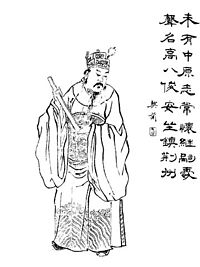Liu Biao
| Liu Biao | |
|---|---|

A Qing dynasty portrait of Liu Biao
|
|
| Warlord of Eastern Han dynasty | |
| Born | 142 |
| Died | 208 (aged 66) |
| Names | |
| Traditional Chinese | 劉表 |
| Simplified Chinese | 刘表 |
| Pinyin | Líu Biǎo |
| Wade–Giles | Liu Piao |
| Courtesy name | Jingsheng (Chinese: 景升; pinyin: Jǐngshēng; Wade–Giles: Ching-sheng) |
Liu Biao (142–208),courtesy name Jingsheng, was a warlord and the governor of Jing Province who lived in the late Eastern Han dynasty. He was a member of the extended family of the Han emperors, descended from Liu Yu, the fifth son of Emperor Jing.
When the Han Dynasty was consumed with war following the Yellow Turban Rebellion, Liu Biao held the title of governor of Jing Province. Liu Biao later started a war against the warlord Yuan Shu and his minor warlord vassal, Sun Jian. During the Battle of Xiangyang, Sun Jian was put in command of an army on Yuan Shu's orders to assault Liu Biao in Jing Province. Liu Biao appointed Huang Zu to command the forces against Sun Jian. During the battle, one of Liu Biao's strategists, Kuai Liang, devised a plan to eliminate Sun Jian by crushing him with logs as he rode towards the main camp of Liu Biao's camp, and succeeded. Years after, Sun Jian's two eldest sons, Sun Ce and Sun Quan, caused Liu Biao no end of trouble as they sought to avenge their father's death. However, they did not cause Liu Biao's demise as they targeted Huang Zu, who was a general under Liu Biao, instead of Liu Biao himself. Whilst Cao Cao (in the north) was gaining strength, Liu Biao chose to neither help nor hinder his conquests, in part because he had been dealt a defeat against the forces of Sun Ce at the Battle of Shaxian.
During the birth of the third century, during Cao Cao's total victory over the rival warlord Yuan Shao at the Battle of Guandu, Liu Biao still remained neutral, despite being one of the only other warlords in a position to oppose the two powers. Liu Biao, however, eventually decided to shelter Liu Bei, an enemy of Cao Cao and relative in deep lineage when Cao Cao defeated Yuan Shao, where Liu Bei was previously sheltered after the events of 198. This made Liu Biao a target of Cao Cao's wrath due to the fact Liu Bei rebelled against Cao just before the war against Yuan Shao. After the Battle of White Wolf Mountain in 207, when Cao Cao finalized his unification of northern China, a large army was sent to conquer Jing Province. Along with Liu Bei, Liu Biao's forces took several early victories. After impressing the remnants of Yuan Shao's forces into joining his already grand army, Cao Cao's superior numbers eventually took toll on Liu Biao's defenses. With a decline in relations between Liu Biao and Liu Bei, as a result of the meddling of Cai Mao's family, Liu Biao's people were faced with difficulty. To make matters worse, Sun Quan's army had crushed and killed Liu Biao's subordinate Huang Zu at the Battle of Jiangxia and ultimately destroyed Liu Biao's defenses to the south.
...
Wikipedia
